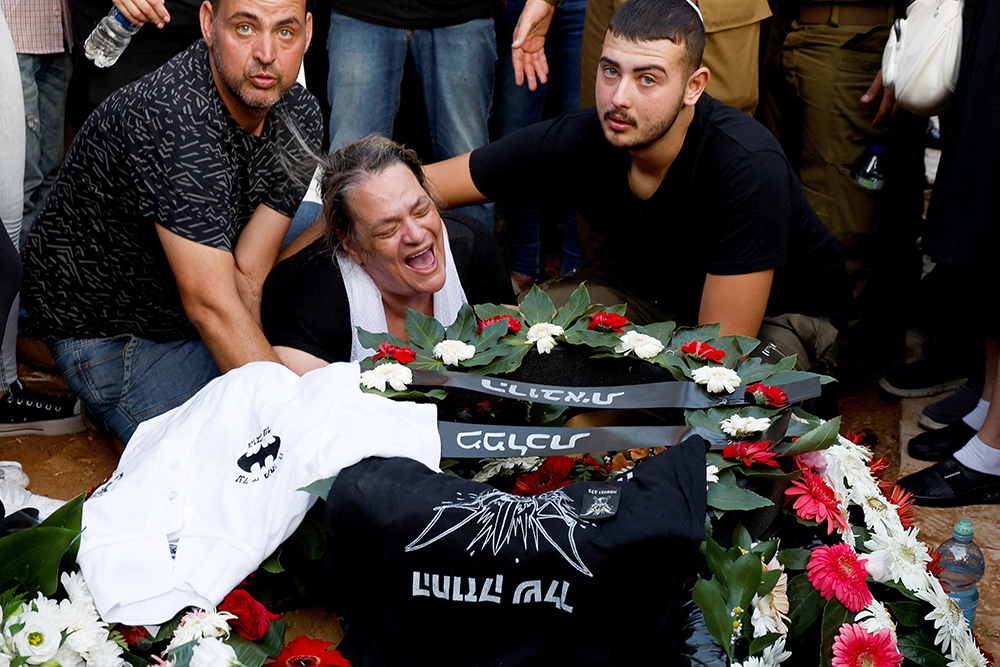
by Engy Magdy
Your peace, cannot be comprehended
Within us and will never end
Despite what the future may bring
You fill our lives with peace
Salam (Peace in Arabic), Salam (Peace)
To all God’s people everywhere
CAIRO — These words of a Christian hymn filled churches in Egypt last week as a security situation has been boiling in the Middle East since the Israel-Hamas war erupted on Oct. 7, when Hamas, the Islamic movement that rules the Gaza Strip, stormed nearby Israeli towns, killing more than 1,400 and abducting hundreds.
During October, Coptic Catholic, Orthodox, and evangelical churches organized prayer meetings for peace in the Holy Land and Egypt.
Last week, 80 priests of the Egyptian Council of Churches prayed for peace in the Middle East at the end of their annual meeting. A week before, Coptic Catholic bishops across Egypt presided over prayers in conjunction with calls by Pope Francis and the Council of Catholic Patriarchs in Egypt to dedicate Oct. 17 to fasting and praying for peace in the Holy Land, the Middle East, and the world.
The Catholic Church in Egypt, headed by Patriarch Ibrahim Ishaq, the Coptic Catholic patriarch of Alexandria and chairman of the Council of Catholic Patriarchs and Bishops in Egypt, called for reaching a peaceful solution between the Palestinians and Israelis, expressing sadness and pain for the bloody events taking place between the two sides.
“Condemning the targeting of civilians and the vicinity of the Baptist Hospital in Gaza, the Catholic Church renews its support for rational calls to ensure that the international community fulfills its responsibilities and activates a real peace process between Palestinians and Israelis that leads to a two-state solution and achieves security and peace in the region,” the Coptic Catholic Church said in a statement last week.
As the conflict intensified between Israel and Hamas, a missile hit al-Ahli Baptist Hospital, a Christian-run medical complex in central Gaza City, killing at least 200 to 300 people on Oct. 18.
The Church affirms unity with all voices calling for peace and the spirit of dialogue to prevail as “war is a defeat for all parties in the end.” The Catholic Church in Egypt responded to the call of Pope Francis to make Friday, Oct. 27, a day dedicated to fasting, prayer, and repentance, “so that we may ask for peace for our days and peace in this world,” the statement said.
Since the war erupted, Egyptians have expressed rejection of violence against civilians and have shown unprecedented sympathy for children and women on both sides, but they have become more sympathetic to Gaza after the scenes of devastation inflicted on the Strip as a result of the airstrike that hit near the compound of the Greek Orthodox Church where at least 16 Christians, including 10 from one family, were killed. “I’m a father to four children, I can feel what it means to lose your family or to see terror in your kids’ eyes, living in fear, waiting to die at any moment,” Youssef, 45, told The Tablet.
However, sympathy is not the only driver of Egyptians’ feelings toward what is happening on their borders, as they have more reasons to worry about a prolonged war. “Coptic Christians in Egypt have no haven but to pray for peace,” said Reham, 32, who is worried about a new wave of security trouble and more woes for Egypt, which is suffering an unprecedented economic crisis.
The financial situation is serious in the countries bordering Israel so the war is threatening to worsen the economic crises and political stability. Last week, Charles Michel, president of the European Council, met with the International Monetary Fund and told officials there that they needed to do more to support the Egyptian government, which he said is under pressure due to the possibility of migrants arriving from Hamas-controlled Gaza as well as people fleeing a civil war in Sudan. “Let’s support Egypt. … Egypt needs our support, and we need to support Egypt,” Michel told reporters, according to AP.
The Gaza Strip is bordered by Egypt on the southwest, as Egypt’s Rafah crossing is the sole crossing point between Egypt and the Strip, where more than 2 million Palestinians live. Egyptians worry of a Palestinian refugee influx which could pose a national security threat. “Operatives from Hamas and other Gazan terrorist groups could infiltrate by posing as refugees and then launch attacks inside Egypt,” said Haisam Hassanein, an Egyptian expert and adjunct fellow at the Foundation for Defense of Democracies.
Hamas was blamed for Egyptian jailbreaks during the chaos of Egypt’s 2011 uprising. In 2013, an Egyptian court said that Muslim Brotherhood members conspired with Hamas, Hezbollah, and local militants to storm Wadi el-Natroun prison on Jan. 29, 2011, and free 34 Brotherhood leaders. Among those who escaped were around 40 members of Hamas and Lebanon’s Hezbollah.
The prison breaks added to the chaos during the 18- day uprising that ousted President Hosni Mubarak, and the flood of criminals onto the streets fueled a crime wave. During 2011 and for several years, Coptic Christians suffered deadly attacks from terrorist and extremist groups.
